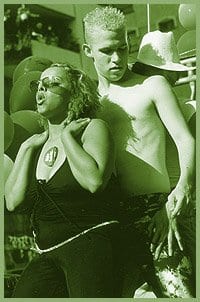What a wacky year for Pride organizers.
First it was ballooning insurance costs. Then a federal funding flip-flop.
Now looming labour disputes are threatening to throw a wrench into this year’s mega event.
“The parade will go on, it will just be really dirty after,” says City Councillor Kyle Rae.
Civil servants with the Canadian Union Of Public Employees, locals 79 and 416, could go on strike just as Pride week begins on Mon, Jun 24. They’re the people who work in City Hall, collect the garbage and work in the parks and recreation department. They’re mostly angry with Mayor Mel Lastman, who wants to hire contract workers who work for less money. But Pride could get caught in the crossfire.
“If they go on strike on the 23rd or 24th it means that the flag won’t go up at City Hall for Pride Day. It means that garbage pickup in our commercial areas will be badly affected and streets won’t be cleaned,” says Rae. “Clean-up will be a problem. And someone is going to have to figure out who
is going to do that.”
Rae says that Pride can’t hire anyone to do it.
“That would be strike breaking and I don’t think they could do that.”
Rae says he doesn’t believe that the city can stop Pride from happening because of the strike.
In happier Pride news, organizers will be getting federal funding that looked to be in jeopardy.
After Pride Toronto received notice it was getting its first-ever government cash through the federal government’s sponsorship program, new Public Works Minster Ralph Goodale froze all sponsorship spending. Though he was trying to stem the sloppy spending that’s gotten the Liberals into so much trouble, it left Pride wondering what would become of it.
“For quite some time it was not clear whether we would receive the government funding or not and we’ve just received verbal confirmation that because we had received a faxed confirmation of the authorization of the sponsorship, that we are eligible for the money this year,” says Pride co-chair Kyle Knoeck. “It appears that we are not caught in the freeze.”
Knoeck says that he doesn’t know the exact amount of the government grant, only that it will range from $25,000 to $50,000 – that falls into Pride’s gold sponsor range.
“We still need to discuss and negotiate the details of exactly how much money comes to us and how much visibility we offer the government in exchange for that – so what sort of banners do they have on the site, and things like that.”
Martin Zibauer, who sits on Pride’s board, says this grant will lead to others.
“If one level of government is involved, it’s easier to convince other levels to get involved because they’ll look at that and say, ‘Oh, the government of Canada is doing it, it must be worthwhile.’
“We’ve always had strong support from the city, which has been the backbone of the event. But having the federal government on board makes it easier to now go to the provincial government and get all governments involved.”
The money comes at a good time, as Pride’s insurance costs grow from $5,000 to tens of thousands of dollars (Knoeck won’t give an exact figure).
The government grant will also go toward making the parade more accessible and more fabulous through new events and more bursaries.
This year Pride’s budget for disability resources is $11,000, up from $6,000.
The additional $5,000 will be spent on making sure Pride has enough sign language interpreters, attendant care services and a second accessible parade viewing stand at St Mary’s (in addition to the one next to Burger King on Yonge St).
“Last year we realized that we’ve hit capacity on [the accessible parade viewing stand] and that there is demand for it and we’re not being able to accommodate everyone who needs that,” says Knoeck.
Pride is also spending twice as much on bursaries for community groups that want to enter the parade but cant’ afford it on their own. Pride is now handing out $10,000 in bursaries, up from $5,000 last year.
“In my budget that I sent in February I originally I asked for a little over $10,000 and they basically said, ‘No can do,’ at that point. So the squeeze was on for a while there and all the groups together were asking for almost $12,000,” says parade co-chair Anita Parker-Laite.
Before her budget was increased, Parker-Laite had granted bursaries to eight groups. Now she estimates that Pride can give bursaries to almost 20 groups.

 Why you can trust Xtra
Why you can trust Xtra


